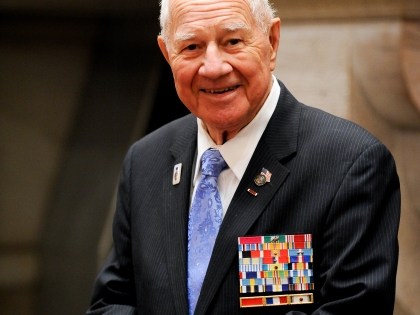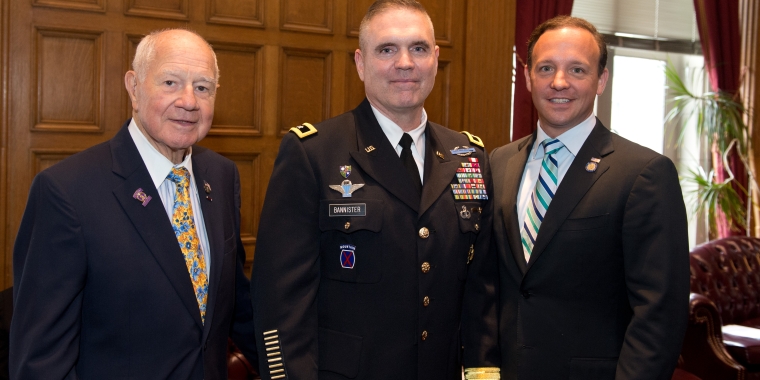
Larkin Announces Senate Higher Education Proposals
William J. Larkin Jr.
January 29, 2007
Senator Bill Larkin (R-C, Cornwall-on-Hudson) today announced the introduction of a comprehensive package of proposals that would make obtaining a college education more affordable for New York’s students.
"This plan will be a tremendous help to students and their families trying to cover the soaring costs of obtaining a college degree," said Senator Larkin. "It will give new incentives to college students to keep them living and working in New York after they graduate. It also specifically recognizes the sacrifices and service of our military personnel by making it easier for New York’s servicemen and women to attend college."
The proposals include expanding the eligibility for the state’s Tuition Assistance Program (TAP), enhancing the tuition tax credit for families, establishing a student loan debt relief program, providing assistance to help our veterans afford college tuition and creating a math, science and engineering technology retention initiative for New York’s students. It provides $141.3 million in relief in SFY 2007-08, growing to $448.3 million in SFY 2008-09 to assist New York’s overburdened taxpayers with paying for the cost of a college education.
"New York’s private, not-for-profit campuses serve a public mission by educating students from all income and demographic groups," said Dr. R. Mark Sullivan, President of The College of Saint Rose and Chair of the Legislative Committee for the Commission on Independent Colleges and Universities Board of Trustees. "Our Independent Sector of higher education has long been committed to helping students and their parents meet college expenses with their own grants and scholarships, combined with aid from state and federal programs. We look forward to continuing and enhancing this partnership."
TUITION ASSISTANCE PROGRAM (TAP) ENHANCEMENT
:The maximum TAP award has remained unchanged since 2000. Although SUNY ($4,350) and CUNY ($4,000) tuition rates are still below the maximum TAP award of $5,000, they have risen by 28 percent and 25 percent respectively since 2000, while tuition rates at independent colleges and universities have increased by 33 percent.
Aside from tuition costs, New York families continue to face significant increases in other college-related expenses. For example, since the Fall of 2000, room and board rates at SUNY have increased by 30 percent to $8,285 in 2006. Mandatory fee rates have also risen by 51 percent to $1,010 at SUNY, and by 48 percent to $573 at CUNY. The 2007 TAP expansion/enhancement initiative will:
Increase dependent students household income eligibility cap for TAP from $80,000 to $100,000 net taxable income (NTI).
Increase nondependent students income eligibility for TAP from $10,000 to $12,500 net taxable income (NTI).
Raise the minimum TAP award under the TAP award schedule for families with dependent students from $500 to $1,000.
Change the TAP award schedule to enhance awards to middle-income New Yorkers.
Expanding TAP will help New York families keep pace with the rising cost of higher education and extend TAP benefits to 21,000 more New York State families. These changes will require a state investment of $104.3 million in SFY 2007-08 with a full annual investment of $148.9 million.
EXPANDING TUITION TAX CREDITS:
To help families keep pace with the rising cost of higher education, the Senate Majority proposes an increase in the amount of deductible tuition expenses for New York families to $14,000 from $10,000. The tax credit will increase from 4 percent to 5 percent of eligible tuition expenses, or a maximum of $700, instead of the current maximum of $400, benefiting all New Yorkers with college expenses. This measure will require approximately $5 million in new state investment in SFY 2007-08 and $65 million in SFY 2008-09 and future years.
STUDENT LOAN DEBT RELIEF PROGRAM:
Student indebtedness is becoming a national crisis affecting many New York State college graduates. The average college graduate from a public institution now owes $17,250 in student loan debt, or $40,000 if they attended a private university. Many graduates make payments on their student loans for 15 years or more after graduation.
To assist students with college loans, and to give them an incentive to stay in New York State, this proposal establishes the New York State Student Loan Debt Relief Program to provide a tax credit of up to 50 percent for college graduates (maximum of $1,000) toward student loan payments per year for those earning $50,000 or less. The tax credit is available for five years, beginning in the 2007 tax year. To be eligible, tax filers are required to remain an employed resident of New York State during the period they claim the tax credit and must also have received a degree from an approved higher education institution in New York.
The loan program will substantially reduce the default rate while providing incentives for college graduates to remain in New York State after graduation. It will pay up to $1,000 to each qualified graduate at a cost of $30 million in SFY 2007-08, with a full annual cost of $275 million.
MATH, SCIENCE & ENGINEERING TECHNOLOGY:
Enhancing New York’s competitiveness in a technology-driven global economy is a critical component to higher education. This proposal establishes the New York State Math, Science and Engineering Technology Retention Program to increase the pool of science, engineering and technology professionals in the state, and to keep these graduates in New York.
The initiative provides $1,000 in state grant money in the first year to 1,000 undergraduate or graduate students living in New York State with a degree in math, science or engineering technology for each year of employment in any science, engineering or technology field, other than teaching, in New York State for up to five years (beginning with 2008 tax year) for degrees awarded in the 2007-08 academic year and beyond.
Under the proposal, 1,000 new undergraduate and graduate grants will be awarded each year for five years, for a total of 5,000 grants. The program is fiscally neutral in SFY 2007-08 with state funding rising to $1 million for SFY 2008-09, and $5 million when fully phased in by SFY 2012-13.
In addition to increasing the amount of professionals in these critical fields, a related initiative would increase the number of annual awards under the New York StateMath and Science Teaching Incentive Program to 750 from 500. This existing program was designed to increase the number of certified middle and high school math and science teachers, by providing students enrolled in an approved teachers' certification program with tuition reimbursement up to the amount of SUNY tuition for each year they complete in that program.
Under this proposal, recipients must agree to teach in the classroom on a full-time basis for five years in the field of math or science in a school located within New York State. The expansion would be fiscally neutral in SFY 2007-08 and require state investment of $1.1 million in SFY 2008-09.
VETERANS TUITION AWARD PROGRAM:
Currently, veterans who serve in harm’s way are provided only $2,000 in state grants if they enroll in an approved vocational, undergraduate or graduate program. This measure would increase the maximum tuition assistance grant to veterans of the Iraq, Vietnam, Persian Gulf, Afghanistan or Korean Wars from $2,000 to $4,350 or equivalent tuition rate at SUNY schools, with an estimated state investment of approximately $2 million in SFY 2007-08.
Share this Article or Press Release
Newsroom
Go to NewsroomFort Drum Visits Albany
June 2, 2015

Memorial Day 2015
May 21, 2015
